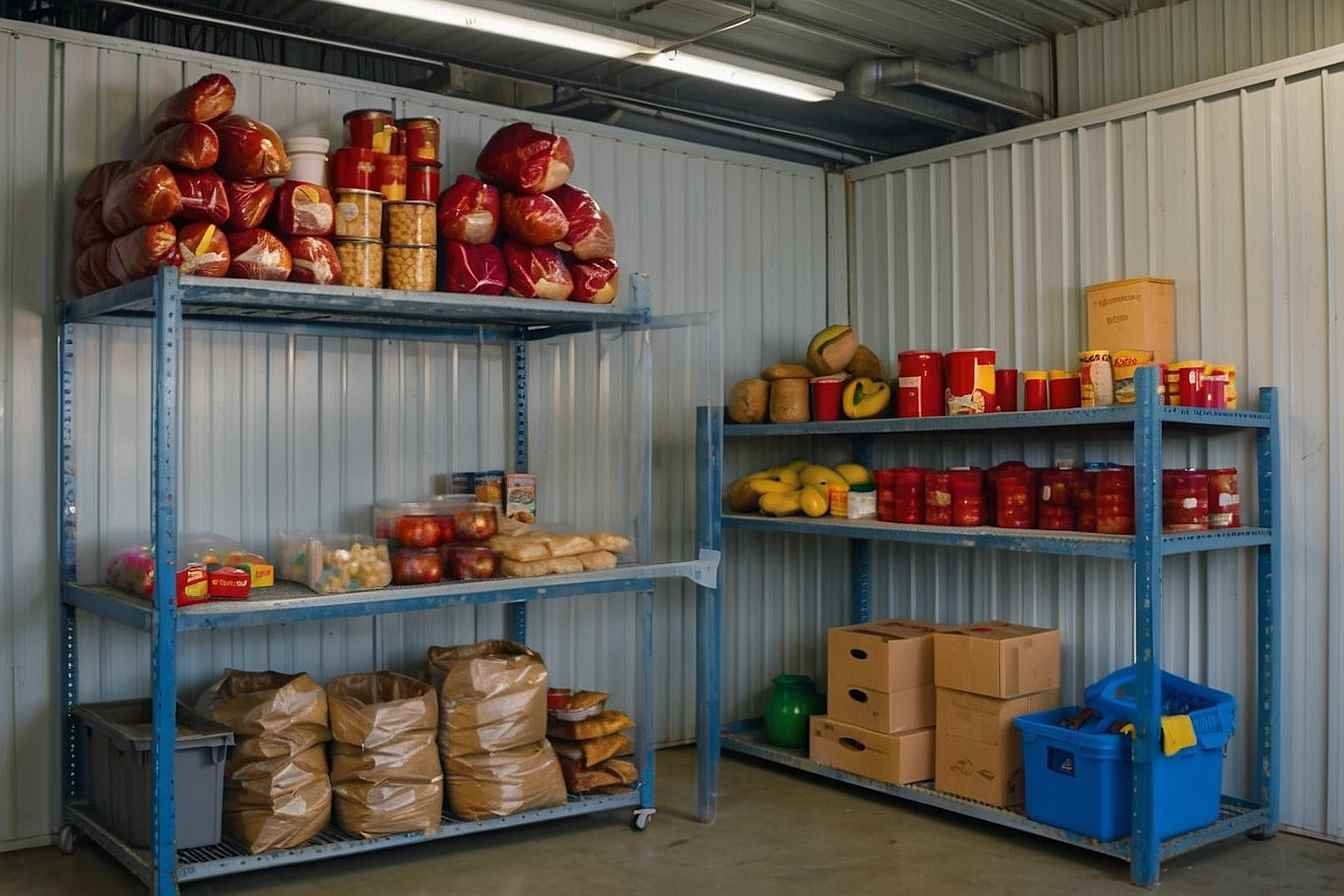When confronted with limited room at home, many individuals consider renting storage facilities to keep a variety of goods, including surplus possessions and seasonal items.
However, a frequently asked topic is, can you store food in a storage unit? In this complete tutorial, we’ll look at concerns and precautions for storing food in a storage unit, including both perishable and non-perishable products.
Let’s look at options and restrictions for ensuring safety and quality of your stored food.
Can You Store Canned Food in a Storage Unit?
One of the most important considerations when storing food in a storage unit is the sort of things you intend to store.
Canned food may appear to be a practical storage choice due to its long shelf life. However, it is important to examine environmental conditions within the storage container.
Extreme temperatures can degrade the quality of canned foods, perhaps resulting in spoiling or affecting taste and texture.
Can You Keep Non-Perishable Food in a Storage Unit?
Non-perishable food products, such as dry foods and some canned goods, are more suited for storage than perishable things.
These foods often have longer shelf life and are less sensitive to temperature changes. When storing non-perishable food, it is critical to select foods that can resist conditions of the storage unit.
Factors to Consider When Storing Food in a Storage Unit
Look at critical issues to consider while storing food in storage units, such as temperature control and health requirements, as well as spoiling risk and insect problems.
Temperature Control
Some storage containers may lack adequate temperature control. Temperature fluctuations can degrade food quality, particularly for heat or cold-sensitive products.
Health and Safety Regulations
Many storage facilities have strong policies prohibiting keeping perishable commodities owing to accompanying health hazards and insect attraction.
To avoid infractions, familiarize yourself with the facility’s regulations.
Spoilage Risk
Temperature and humidity variations can harm non-perishable materials over time. Assess the climate of the storage container and select goods accordingly.
Pest Concerns
Storage facilities are susceptible to pests. Rodents and insects can get into units, posing a risk to any stored food. Consider this aspect while determining what to keep.
Can You Keep Food in a Storage Unit?
While it may be tempting to utilize a storage unit for extra food storage, you must consider hazards and advantages.
The ability to store food in a storage unit is determined by the type of food, the storage facility’s environment, and compliance with health and safety requirements.
One crucial issue to consider is temperature control within the storage facility. Many storage facilities lack accurate temperature regulation, leaving stored things vulnerable to the effects of the weather.
Extreme temperatures can accelerate the deterioration of food quality, potentially resulting in spoilage, taste loss, and texture changes.
It is critical to assess the environment inside the storage facility and select objects that can endure the current circumstances.
Best Containers for Long Term Food Storage
Choosing the correct containers is essential for storing non-perishable food in a storage unit.
Choose airtight, robust containers that offer an extra layer of protection against environmental variables.
Consider using vacuum-sealed bags, plastic boxes with tight-fitting lids, or Mylar bags to protect your food from moisture and bugs.
Tips for Storing Perishable Things
If you need to temporarily store perishable things, take the following measures. Coolers with ice packs are ideal for short-term storage, keeping temperature-sensitive products secure.
When choosing perishable foods to store, prioritize those with longer shelf life and greater tolerance to temperature fluctuations.
Certain fruits, vegetables, and hard cheeses, for example, may hold up better in a storage container.
Avoid keeping extremely perishable commodities or those with severe temperature requirements unless you can provide proper circumstances.
Monitoring and Maintenance
Proper food storage requires regular monitoring and maintenance. Make regular trips to storage facilities to inspect for signs of deterioration, vermin, or container damage.
This proactive strategy allows you to handle possible concerns before they affect the quality of your stored food.
Legal and Insurance Considerations
Before keeping food in a unit, consider legal and insurance concerns. Violating health and safety laws may result in sanctions or eviction from the storage facility.
In addition, examine your insurance policy to determine the amount of protection for stored objects, including food.
Conclusion
The decision to keep food in a storage unit requires careful deliberation. While non-perishable commodities may be temporarily housed in storage facilities, it is critical to prioritize the quality and safety of the stored food.
Adhering to health and safety laws, selecting appropriate containers, and monitoring environmental conditions are critical for successful food storage in a unit.
Next time you wonder, can you store food in a storage unit? Remember the value of making educated decisions to preserve the lifespan and safety of your stored products.
Whether it’s canned foods or non-perishable things, a smart strategy will allow you to make the most of your storage space while maintaining the quality of your food supply.
Freedomz Storage emerges as an ally, guiding you through the factors to consider and offering practical solutions to enhance your storage experience.
FAQ
Q: Can I keep any sort of food in a storage unit?
A: Non-perishable commodities, such as canned goods and some dry foods, are better suited to storage facilities; nonetheless, it is critical to examine the facility’s requirements and the possible influence of environmental conditions on perishable items.
Q: Are there temperature-controlled food storage units?
A: Some storage facilities include climate-controlled units, which manage temperature and humidity.
These units are more suited to keeping sensitive commodities, such as some types of food. Check with the facility about this option.
Q: Can I keep handmade or bulk-prepared foods in a storage unit?
A: Storing handmade or bulk-prepared food in a storage facility is typically not advisable owing to the increased risk of contamination and deterioration. Focus on professionally sealed and packaged things.
Q: Which containers work best for long-term food storage in a unit?
A: Use airtight and robust containers to safeguard food from environmental elements. Vacuum-sealed bags, plastic boxes with tight-fitting lids, and Mylar bags are all good long-term food storage options.
Q: Are there any legal limits for storing food in a storage unit?
A: Yes, many storage facilities have health and safety restrictions that prevent the storage of perishable commodities.
Violation of these restrictions may result in penalties or eviction from the storage facility.

